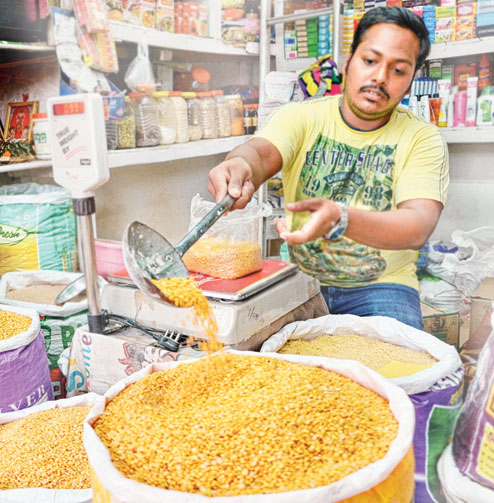
Bhubaneswar, Sept. 13: If onions were not enough, rise in the prices of dal and vegetables have thrown kitchen budget haywire.
While the price of a kilo of arhar dal has crossed Rs 150 in the open market, brinjal is being sold at Rs 60 per kg. Even papaya is being sold at Rs 30 per kg.
This has hurt the budget of middle class families, as they have to shell out Rs 1,500 to Rs 2,000 extra every month. However, food supplies and consumer welfare minister Sanjay Dasburma asked people not to panic.
In the past one year, the spiralling price of essential commodities has forced lower and middle class families to slash their budget.
"Every thing is rising, from house rent to tuition fees of children. But the way the price of essential commodities is going up is really painful," said Sandhya Rani Mohanty, a retired schoolteacher. She said that price of all kinds of vegetables, including brinjal and onions, have doubled.
Dibya Singha Pradhan, a retired government servant, said price rise had forced his family to shun dal, several vegetables as well as mutton and chicken.
Local grocery shop owner at Brit Colony, Nayapali, Alok Jena said that rise in prices of dal and onion had affected the common man and in effect their business.
"They will no more be able to buy pulses," he said.
However, the state government today said it had imported 2,500 metric tonne of pulses to stabilise the price of the commodity in the state.

Food supplies and consumer welfare minister Sanjay Das Burma said: "The National Agricultural Cooperative Marketing Federation of India Limited (Nafed) has procured around 2,500 metric tonne pulses from outside. It will shortly reach the state. The wholesale price of dal has gone down by Rs 500 a quintal. The new crop will be harvested in 15 days to one month. We are taking steps to stabilise the market in the state."
He further said that district collectors had been asked to keep a watch on the market to keep prices under check.
All Odisha Byabasayee Sangha general secretary Sudhakar Panda said: "The dal price in the market will stabilise within a fortnight. But the fact is that the rate did not touch Rs 150 per kg overnight, it has been rising steadily."
Panda explained that the extraordinary rise in prices of dal was linked to imports as the local stock in arhar producing states such as Chhattisgarh, Madhya Pradesh, Andhra Pradesh, Karnataka and Maharashtra had almost finished.
While the state needs 11.2 lakh metric tonne of arhar dal per annum, it only produces one lakh metric tonne. For the rest, the state depends on the major supply chains including Raipur, Chhattisgarh, Madhya Pradesh and Andhra Pradesh, Karnataka and Uttar Pradesh.
"The price of the dal will be reduced by Rs 7 per kg if the state government waives the VAT from dal. Now it is imposing five per cent VAT on the dal, which is a burden on people. The state government should consider this immediately and reduce the VAT from five per cent to one per cent so that people could get a timely relief." Panda told The Telegraph.
Similarly, in the case of onion, the state has witnessed the shortage as the supply from Andhra Pradesh and Bangalore has come down and there the price has gone up because of the untimely rainfall.
"The market price of onion will stabilise only after the stock from Nashik reaches the state after Diwali" said Panda.










